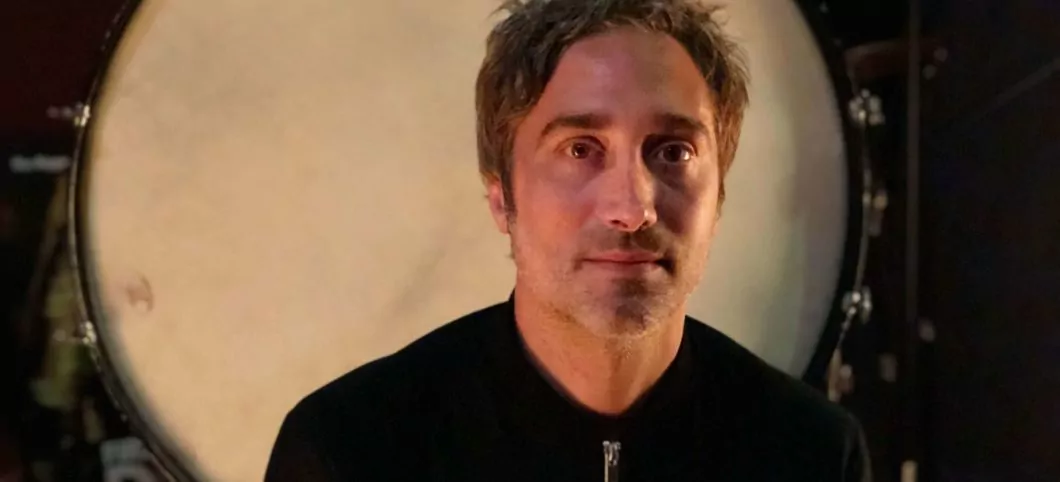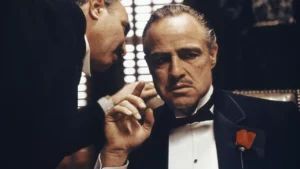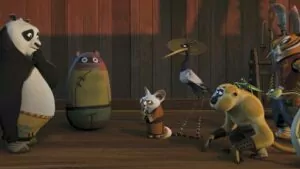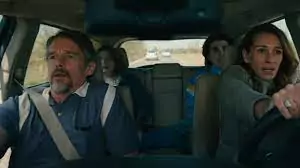
Jeff’s talents range from intimate independent fare to full orchestral majesty. With over 45 feature film scores and several network series to his credit, one can hear his work worldwide every day. His unique ability to cross genres has made him a powerful player in the film composing industry. We spoke to him about his show “Heels” which is currently streaming on Starz.
Q. What was it about this show that specifically drew you into it?
Jeff Cardoni: I read the first script and I was like, I have to do this show. It’s got everything. I like the drama and just the realness of it, how grounded it felt and how it just read like a movie. So that’s great. Right. So, and obviously Michael Waldron is one of the most popular writers and especially after his amazing work.
Q. I wanted to know what was the collaboration process with Michael, like in terms of creating the score.
Jeff Cardoni: Along with Michael, Mike O’Malley was also very involved. It was really pretty organic, when I got the script, I wrote the demo based on reading it and what I thought the show would sound like. It worked out very well. It kind of became the sound of the whole show, but just that original demo I did, I felt that, it was in the south, so it needed to be, grounded in middle America.
I felt like using clean electric guitar and piano; keeping it really minimal as it would then address kind of the working class roots. Because of COVID, we didn’t have a lot of in-person interaction. So I just got to write a bunch of music away from pictures while they’re shooting. Then that stuff started coming in. It was just working, the editors were putting it in. It was one of those moments where it just kind of works out. We just got lucky where everything just seemed to fit. And it was really honest. I was overjoyed because I got to add something. We weren’t trying to emulate anything else.
There was no temp music. There was no discussion of anything. It just worked and that became our world. And it was great. It was pretty fortunate. Able to work in my own space. I don’t ever want to go back to the other way so fast. And there’s a million people weighing in, you know, because everything gets diluted that way. The same way a writer starts with a blank page, I started. And I felt like at least the music started from that pure point of view and, you know, lucky for me, I worked out and it just seemed to fit.
The theme song was one of the last things that happened. Like we were working on. Episode six or whatever. And, and every time I got an episode, the main titles were blank, you know, cause they didn’t know what it was going to be yet.
So I had an idea of what I thought it would be before I knew it was going to be a song. So I wrote that piece of me. And I just started plugging it in the shelf. So that was all kind of going on in the backroom, but I just kept putting my thing in the shelf, because I felt like it tied all of the music and the show together. So eventually someone was like, what is this? This is kind of work on the theme song. Then I got to give it to the music supervisor. He suggested and paired me up with a singer on it. I got a call from John and he said, can you get on a zoom with Ben in like three minutes? I am a huge fan of Ben. He’s just such an artist, he’s out there, you know, he’s a true what you think of a singer, a really artistic unique singer was. And so we just talked through it a little bit.
I played him the track and he seemed to like it. We had like two days, because it was really heavy, good stuff but the network wanted it to be soft. So we were kind of the dark horse in that, in that, you know, we’re, we’re given an opportunity to compete with all the other bands.
And, um, I remember the next morning I was laying in bed and Ben sent me a voice text and I’m not a singer so we discussed this over again. But then like two days later I was sitting in my phone and Ben’s like, I just sent you something, check it and I’ve put it on the car. And like, it was just magic. When he sang the chorus, it was just like, oh my.
Every hair on my body stood up and I was like, oh my God, this is like magic. You know, it was just great. It was a pure, you know, again, it was just a pure collaboration in that we were just trying to do what we thought was right. There was no direction. It’s the reason why you create, it’s a reason why you do music because it’s magic when you kind of catch it. And I felt like that song after listening to 8,000 times, it’s still, magic. It clearly shows the theme song energy.
Q. So you were approached for Heels just after you released your solo album. how did your solo album sort of lead to you getting to be the composer or doing scoring Heels?
Jeff Cardoni: I remember when I first did the demo for Heels, my solo album was coming out like a month later, I sent the demo and then I said, by the way, I just did a record and it’s kind of in this ballpark of what I think your show should sound like. Cause it was an electric guitar and the string quartet. Then they would send me tracks from the album, that they thought might work in the show. It was just one of those things where my sensibility just linked up with Mike and for whatever reason, maybe it was because we’re all in different places, there are not a lot of outside influences going on. And I just felt like from day one, He was just digging what I was doing.
And so it was crazy because I just felt competent to kind of bring myself to the table and it just doesn’t happen that often. I think when you see the show it just feels like the show is a work of love for everyone. And I know Michael Waldron was involved for a long, long time.
Q. This has been such an exciting year for you with the Kominsky method, Turner and Hooch, and now Heels coming out. How did the link, and the contrasting personalities of each of these subjects influence your process work?
Jeff Cardoni: That’s a good question, I guess when it boils down to you, you just try to find out what is the heart of each project. What is the tone? What’s it going to be? And just try to bring your version of that to the project and ironically with all three of those, it was very much like this commitment.
Chuck Lorre had no idea what he wanted to do in terms of music cause most of the shows he’s done have been a Multicam. So he never really worked with music score anyway. So it was a process because again, we didn’t really have a template. He had no idea. It was, it was a lot of trial and error, but again, that’s, that’s really rewarding because when you come up with it feels like, at least you brought like, I, as a composer, I don’t want to get hired to do my version of something else. Do you know what I mean? Like it’s most rewarding when you bring something to the table.
I think that’s why people bring creatives. They want to hear your opinion. They don’t want to say to do this. They want to be surprised, you know? So I felt like I’m convincing him when we finally got it. It was. It was really pure again, and it felt great and Turner and Hooch in a different way. Turner and Hooch is very broad.
It’s got to cover a lot of current themes. So that was just a lot of music and a lot of different emotions and styles. Then you have Heels. If there’s something that feels like me. It’s honestly, I’ve been doing this for a long time and I’m most excited about this show. One of them, anything I’ve ever done.
I think the pilot’s one of the best hours of television I’ve ever seen. I, I can’t wait for it. It doesn’t even matter that it’s about wrestling. Like if you don’t need to know anything, it doesn’t matter. It’s just a good show.
It’s just a good drama. The wrestling is amazing because these people weren’t even stumped almost. They did all this stuff. So the sheer physicality is just unbelievable. But if you, even if you take that part out, just the jock drama and the characters and the writing it’s really great.
All the brotherhood and the drama, it also forms the base of the show.
Q. You’ve made a lot of different projects in COVID and all of those sort of were very different from what you did earlier. Would you really consider being in the same situation for the near future or would you prefer going back to the same?
Jeff Cardoni: There are good things about both, you know, and hopefully we find some kind of middle ground. I enjoy having more time to think and to really get into stuff. You know, there’s something about not having to drive halfway across town, to have a conversation about something where you can really just spend more time here in the lab, really thinking about things more.
I think a lot of music and it’s having time to kind of get ideas. To let music percolate in your brain. If I sit at the piano and I have a melody and I have two weeks to get it in there, if you’re still thinking of it, then like, then it’s writing. And then when you start writing, it’s, it’s coming from somewhere else.
If you just see a picture and you have to start writing that day because it’s due two days from now, it’s a different mindset, you know? I much prefer to have the tune of something in my head and kick around for a bit. And I think it goes the same for producers and we’re reacting to what they do. If we have to go playback though, a version of a score and everyone’s sitting in the room, they’re hearing it for the first time and then you’re forcing them to react and give notes and do, and it’s, I really think that’s not the best way to do it. The best way is to send it to someone, let them live with it for three days, four days, and watch it a few times.
And then you get into your head and then you’re approaching the notes from a different perspective. The first time, it was always just like ripping off a bandaid. It’s like getting rid of someone’s preconceptions of what they heard before with what they thought they were going to hear. I think you have to get that out of the process before you can really get to the root of what’s working and what’s not working.
I think during COVID we got to do that mark because everyone was watching things watching them many times. So they had more time to live with things. And especially with Heels, you know, my music would go into cuts and they stay with the cuts for weeks. And if a piece of music is still working after two weeks, then you did something, right.
And then it becomes part of the fabric of the show. If they didn’t like the way it started the first time they heard it. And they’re forced to give a note five seconds later, that thing might get thrown away where, where it didn’t necessarily need to get thrown away. Just leave some time to figure it out.
So that part of COVID I think, was creatively better for life people, you know? Um, but I do miss seeing people in person, then I do miss the reactions and the flip side of that. When you’re sitting with people in the room, you can read body language, you can read little comments and you can kind of read in between the lines and kind of feel what’s working and even what’s not working and sometimes that’s harder to do.
And that that’s when it sticks with me. And that’s, I think what book. Yeah. And you had longer time to develop. I mean, I think you can approach a show more like a movie in that way where you have more time and it’s, it’s a bigger canvas and you can have a melody and themes that you’ve run through all the episodes and have time for them to develop and things like that.
Which again, sometimes you can’t do that one if everything goes back to how it was so quickly. So I hope we don’t go totally back to the way it used to be, but I do know that I miss people.
Q. I want to know if you think that watching a movie on a laptop or a TV changes the way people perceive music scores? And does that affect the way you create the score for the film?
Jeff Cardoni: For sure it affects how people perceive it. And I think some things are just meant to be seen in a theatre. I don’t know for me to necessarily change is how you write it. You can write a little more subtly when it’s going to be seen in the theatre because you’re totally immersed whereas if you’re watching on a laptop, you’re competing with all the sounds around people.nd so I think the music has to be a little louder or less subtle to cut through just the ambient noise of people’s lives, whereas in a theatre you have a captive audience. But I think that being said, everything is changing so much. Now, as far as what movies are going to theatres, what isn’t going to theatres what’s TV, what’s not TV.
You know, I mean the production values on TV are just as high as. The trickle things these days and especially extreme. Cause you’re getting into these long-form, pretty much eight-hour movies. They’re mixing them. I mean, heals is mixed in Atmos, which is what they do and all the big theatres these days.
So it’s sounds as good if not better. And if you watched it in a theater, it would sound just as good as any movie. I mean, if you’re, if you’re writing like a big action thing, that’s going to be in the theater. I think there’s some things you do that you knew it was going to go to TV, you might not do just as far as like the low end, you can really do things super low.
If you know that it’s going to be listened to in a theater with the correct system. Whereas when it gets to people’s TV, a lot of stuff goes away. So it’s a balance, but, um, you don’t want to lose that energy down there. If you know people, some people are going to be able to hear it the way you didn’t.
Q. You mentioned in an interview once that you put a melody over ambient textures and I want to know what that really signifies and how it works.
Jeff Cardoni: I’m more of an acoustic instrument kind of person. So, uh, ambient textures for me, or using guitars or whatever to make these sound beds. So just by nature of what I do, most of the stuff is acoustic instruments and that’s just the kind of music that speaks to me. I don’t know if that’s really applicable to a lot of these things that I’ve done this year. You know, Kominsky was all, all live instruments but mostly if it’s something simple I use a Mellotron, cause that’s like a throwback saying it’s not really a sin, but that’s, that’s just what I respond to.
I try to have everything come from an organic place. That’s just what I like. And I’ve just gotten to a point in doing this, that that’s just what speaks to me. And so I try to find projects where I get to do that. You know, where some people are electronic music, you know, really good at that. And that’s what they’re drawn to.
I feel like we all started as composers wanting kind of to do everything and we want to be everything to everyone, but I feel like the further you get along. You realize what you like to do. And obviously, we have to conform to what the project is, but I feel like at this point, I know what I would bring to a project, whether it’s right or not, I’d rather be wrongdoing what I do than do my bad version of, you know, what someone else does better.
So, so I think as you go along, it’s better to try to find things that you can add something to, instead of being an emulation. That’s something else that’s better. I think it’s just the integrity of what we do. We just want to be true, to a project.
You don’t want to do it because you did the job. You want to do it because as an artist, as a musician and you want to bring something of yourself to it. Cause that’s why they’re bringing you in, they don’t want a robot to do it.
You’re never going to explore those things if you stick to doing everything. You’re never going to have these happy accidents that have happened by trying your approach to something.
Q. After three projects this year, what’s next for you at this already busy year?
Jeff Cardoni: I got a bunch of things. I got a little movie that comes out tomorrow called Reiki. It’s got Susan Brandon and JK sermons. It’s like a dramedy. I got a show called ghosts for CBS that’s coming out. That’s kind of very much like Beetlejuice. It’s like over the top.
I am a big fan of BBC shows. I’m doing a pilot right now. I got a movie called maximum truth that a friend of mine, David Stassen. It’s kind of a political parody. It’s pretty good. It is going great, actually. I get to sit here and be busy making music. I mean, that’s the dream. That’s 10 years old and I’m still doing it.
The Movie Culture Synopsis
“Heels” is currently streaming on Starz. Go check it out to witness Jeff’s brilliant score.



